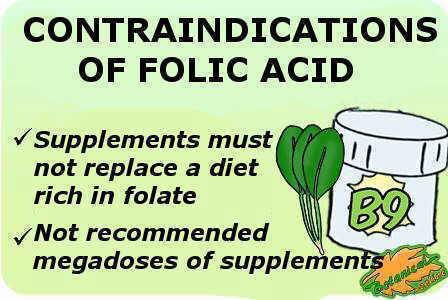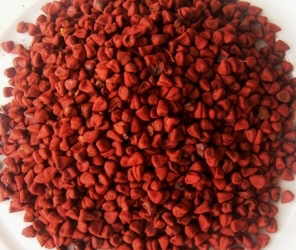Contents
Who should not take supplements with folic acid
What contraindications does folic acid have?
Folic acid (vitamin B9) is a water-soluble vitamin B that is abundantly found in food. The foods richest in this vitamin are vegetables, such as spinach. It has properties to improve cardiovascular health and as an essential vitamin during pregnancy.
It is impossible not to consume folic acid and there are no people allergic to this nutrient. However, despite its undoubted benefits, sometimes supplementation with this vitamin must be controlled to avoid possible adverse effects.
Main contraindications of folic acid
As an essential nutrient, folic acid does not present significant contraindications or toxicity.
The main dangers associated with the use of this type of supplements is to postpone proper treatment and replace a healthy diet for a supplement, with the consequent damage to health.

Contraindications of folic acid (vitamin B9) and spinach, the richest food in this nutrient.
Many people use folic acid supplements because they have read that they are necessary to improve cardiovascular health or that they are “healthy”, without taking into account that their potential benefits must be framed within a healthy diet and lifestyle.
This is the case of overweight people who want to improve the health of their heart by taking these supplements (folic acid decreases levels of homocysteine, whose high levels are related to heart disease and high cholesterol problems and cardiovascular accidents). In these cases, better than supplements, one should begin by eliminating what increases the cardiovascular risk: quitting smoking, not eating sugar, physical activity and avoiding the obesogenic environment.
Supplements never replace food
On the other hand, although it is evident and the warning is contained in all food supplements, a supplement never has the benefits of foods naturally rich in vitamins. Vegetable foods, naturally rich in folates (vitamin B9 or folic acid), provide fiber, magnesium, calcium, potassium, chlorophyll, beta-carotene and other beneficial substances.
Therefore, although supplements are taken, you must follow a healthy diet and lifestyle.
Folic acid for people with kidney diseases
Folic acid has only one important contraindication, rather a warning, and that is that when administered in people with advanced kidney failure or in certain kidney problems, or people with kidney transplants, it should be taken in its “methyl” form ( 5-MTHF).
In addition, in these cases, which are very specific, high levels of phosphorus, potassium, proteins and salt in the diet are also harmful. These people should be put in the hands of a dietitian nutritionist expert in kidney nutrition.
In healthy people, folic acid does not present any contraindication to the kidneys. It is also not recommended to take the “methyl” form of the vitamin if there is no indication that requires it.
Megadoses of vitamin B9
In certain pharmacological treatments, that is, through medications or supplements, folic acid can cause adverse reactions related to convulsive effects, zinc depletion due to decreased absorption, or masking a vitamin B12 deficiency. This happens when quantities much higher than the nutritional requirements are administered, such as 5, 10 or up to 15 mg of folic acid.
* Related information:
– Folic acid diet during pregnancy
![]() More information on vitamins.
More information on vitamins.
| Vitamin B1(Thiamin) | Vitamin B2(Riboflavin) | Vitamin B3(Niacin) |
| Vitamin B5(Pantothenic acid) | Vitamin B6(Pyridoxine) | Vitamin B7(Biotin) |
| Vitamin B9(Folic acid) | Vitamin B12(Cobalamin) | Choline |
| Inositol | PABA | Lipoic acid |
![]() More information about vitamins.
More information about vitamins.








